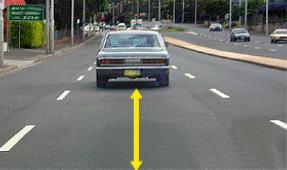| 1 |
Under good conditions, when driving behind any vehicle, at any speed, you should: |
|
| 2 |
When driving in wet weather, your vehicle will: |
|
| 3 |
At night, if an oncoming vehicle's headlights dazzle you, you should: |
|
| 4 |
If you get sleepy while driving, it is best to |
|
| 5 |
In wet weather when it becomes hard for you to see, you should: |
|
| 6 |
If you are driving and it starts to rain, you should |
|
| 7 |
When driving on a slippery wet road, for example, one covered in early morning dew, your vehicle will: |
|
| 8 |
Why should you avoid heavy braking on a wet road? |
|
| 9 |
At night you should: |
|
| 10 |
When it is very foggy during the day or night and your vehicle has no fog lights, you should |
|
| 11 |
When going on a long trip, out of the following which is the most important to do? |
|
| 12 |
At night, when you approach an oncoming vehicle, you should: |
|
| 13 |
Driver fatigue can be prevented by which of the following: |
|
| 14 |
Most crashes caused by fatigue occur between what hours? |
|
| 15 |
The only effective way to deal with driver fatigue is to: |
|
| 16 |
It is important to scan while driving so you can see everything that is happening on the road. What does scanning involve? |
|
| 17 |
You should leave a gap between your vehicle and the one you are following. In good conditions the gap should be: |

|
| 18 |
While driving, you come across aggressive, selfish or ignorant driving behaviour by another driver. You should: |
|
| 19 |
In addition to your work and rest hours what must you include in your work diary? |
|
| 20 |
If you are working under Standard Hours and drive a vehicle with a GVM greater than 12 tonnes, in a period of 8 hours what is the minimum rest time? |
|
| 21 |
If you are a solo driver working under Standard Hours and drive a vehicle with a GVM greater than 12 tonnes, what is the maximum number of hours you may drive in any seven day period? |
|
| 22 |
How many days of work diary driving records must you keep in your vehicle? |
|
| 23 |
If you are a solo driver working under Basic Fatigue Management hours and drive a vehicle with a GVM greater than 12 tonnes, in a period of 9 hours what is the minimum rest time? |
|
| 24 |
If you are working under Standard Fatigue Management Hours, what is the maximum number of hours you are allowed to work in any 24 hour period? |
|
| 25 |
If you are working under Standard Fatigue management Hours, in a two-up arrangement what is the maximum number of hours you are allowed to work in any 24 hours period? |
|
| 26 |
If you are working under Standard Fatigue Management Hours, in a two-up arrangement, what is the maximum number of hours you are allowed to work in any 7 day period? |
|